- Home
- Robert E. Howard
The Best of Robert E. Howard, Volume 2 Page 14
The Best of Robert E. Howard, Volume 2 Read online
Page 14
Then after an indecisive skirmish at Newcastle, Douglas encamped in a place called Otterbourne, and there Lord Percy, hot with wrath, came suddenly upon him in the night, and in the confused mêlée which ensued, called by the Scottish the Battle of Otterbourne and by the English Chevy Chase, Lord Douglas fell. The English swore he was slain by Lord Percy, who neither confirmed nor denied it, not knowing himself what men he had slain in the confusion and darkness.
But a wounded man babbled of a Highland plaid, before he died, and an ax wielded by no English hand. Men came to Donald and questioned him hardly, but he snarled at them like a wolf, and the king, after piously burning many candles for Douglas’ soul in public, and thanking God for the baron’s demise in the privacy of his chamber, announced that “we have heard of this persecution of a loyal subject and it being plain in our mind that this youth is innocent as ourselves in this matter we hereby warn all men against further hounding of him at pain of death.”
So the king’s protection saved Donald’s life, but men muttered in their teeth and ostracized him. Sullen and embittered, he withdrew to himself and brooded in a hut alone, till one night there came news of the king’s sudden abdication and retirement into a monastery. The stress of a monarch’s life in those stormy times was too much for the monkish sovereign. Close on the heels of the news came men with drawn daggers to Donald’s hut, but they found the cage empty. The hawk had flown, and though they followed his trail with reddened spurs, they found only a steed that had fallen dead at the seashore, and saw only a white sail dwindling in the growing dawn.
Donald went to the Continent because, with the Lowlands barred to him, there was nowhere else to go; in the Highlands he had too many blood-feuds; and across the border the English had already made a noose for him. That was in 1389. Seven years of fighting and intriguing in European wars and plots. And when Constantinople cried out before the irresistible onslaught of Bayazid, and men pawned their lands to launch a new Crusade, the Highland swordsman had joined the tide that swept eastward to its doom. Seven years – and a far cry from the border marches to the blue-domed palaces of fabulous Samarcand, reclining on a silken divan as he listened to the measured words which flowed in a tranquil monotone from the lips of the lord of Tatary.
III
If thou’rt the lord of this castle,
Sae well it pleases me:
For, ere I cross the border fells,
The tane of us shall dee.
– Battle of Otterbourne
Time flowed on as it does whether men live or die. The bodies rotted on the plains of Nicopolis, and Bayazid, drunk with power, trampled the scepters of the world. The Greeks, the Serbs and the Hungarians he ground beneath his iron legions, and into his spreading empire he molded the captive races. He laved his limbs in wild debauchery, the frenzy of which astounded even his tough vassals. The women of the world flowed whimpering between his iron fingers and he hammered the golden crowns of kings to shoe his war-steed. Constantinople reeled beneath his strokes, and Europe licked her wounds like a crippled wolf, held at bay on the defensive. Somewhere in the misty mazes of the East moved his arch-foe Timour, and to him Bayazid sent missives of threat and mockery. No response was forthcoming, but word came along the caravans of a mighty marching and a great war in the south; of the plumed helmets of India scattered and flying before the Tatar spears. Little heed gave Bayazid; India was little more real to him than it was to the Pope of Rome. His eyes were turned westward toward the Caphar cities. “I will harrow Frankistan with steel and flame,” he said. “Their sultans shall draw my chariots and the bats lair in the palaces of the infidels.”
Then in the early spring of 1402 there came to him, in an inner court of his pleasure-palace at Brusa, where he lolled guzzling the forbidden wine and watching the antics of naked dancing girls, certain of his emirs, bringing a tall Frank whose grim scarred visage was darkened by the suns of far deserts.
“This Caphar dog rode into the camp of the janizaries as a madman rides, on a foam-covered steed,” said they, “saying he sought Bayazid. Shall we flay him before thee, or tear him between wild horses?”
“Dog,” said the Sultan, drinking deeply and setting down the goblet with a satisfied sigh, “you have found Bayazid. Speak, ere I set you howling on a stake.”
“Is this fit welcome for one who has ridden far to serve you?” retorted the Frank in a harsh unshaken voice. “I am Donald MacDeesa and among your janizaries there is no man who can stand up against me in sword-play, and among your barrel-bellied wrestlers there is no man whose back I can not break.”
The Sultan tugged his black beard and grinned.
“Would thou wert not an infidel,” said he, “for I love a man with a bold tongue. Speak on, oh Rustum! What other accomplishments are thine, mirror of modesty?”
The Highlander grinned like a wolf.
“I can break the back of a Tatar and roll the head of a Khan in the dust.”
Bayazid stiffened, subtly changing, his giant frame charged with dynamic power and menace; for behind all his roistering and bellowing conceit was the keenest brain west of the Oxus.
“What folly is this?” he rumbled. “What means this riddle?”
“I speak no riddle,” snapped the Gael. “I have no more love for you than you for me. But more I hate Timour-il-leng who has cast dung in my face.”
“You come to me from that half-pagan dog?”
“Aye. I was his man. I rode beside him and cut down his foes. I climbed city walls in the teeth of the arrows and broke the ranks of mailed spearmen. And when the honors and gifts were distributed among the emirs, what was given me? The gall of mockery and the wormwood of insult. ‘Ask thy dog-sultans of Frankistan for gifts, Caphar,’ said Timour – may the worms devour him – and the emirs roared with laughter. As God is my witness, I will wipe out that laughter in the crash of falling walls and the roar of flames!”
Donald’s menacing voice reverberated through the chamber and his eyes were cold and cruel. Bayazid pulled his beard for a space and said, “And you come to me for vengeance? Shall I war against the Lame One because of the spite of a wandering Caphar vagabond?”
“You will war against him, or he against you,” answered MacDeesa. “When Timour wrote asking that you lend no aid to his foes, Kara Yussef the Turkoman, and Ahmed, Sultan of Bagdad, you answered him with words not to be borne, and sent horsemen to stiffen their ranks against him. Now the Turkomans are broken, Bagdad has been looted and Damascus lies in smoking ruins. Timour has broken your allies and he will not forget the despite you put upon him.”
“Close have you been to the Lame One to know all this,” muttered Bayazid, his glittering eyes narrowing with suspicion. “Why should I trust a Frank? By Allah, I deal with them by the sword! As I dealt with those fools at Nicopolis!”
A fierce uncontrollable flame leaped up for a fleeting instant in the Highlander’s eyes, but the dark face showed no sign of emotion.
“Know this, Turk,” he answered with an oath, “I can show you how to break Timour’s back.”
“Dog!” roared the Sultan, his gray eyes blazing, “think you I need the aid of a nameless rogue to conquer the Tatar?”
Donald laughed in his face, a hard mirthless laugh that was not pleasant.
“Timour will crack you like a walnut,” said he deliberately. “Have you seen the Tatars in war array? Have you seen their arrows darkening the sky as they loosed, a hundred thousand as one? Have you seen their horsemen flying before the wind as they charged home and the desert shook beneath their hoofs? Have you seen the array of their elephants, with towers on their backs, whence archers send shafts in black clouds and the fire that burns flesh and leather alike pours forth?”
“All this I have heard,” answered the Sultan, not particularly impressed.
“But you have not seen,” returned the Highlander; he drew back his tunic sleeve and displayed a scar on his iron-thewed arm. “An Indian tulwar kissed me there, before Delhi. I rode with the
emirs when the whole world seemed to shake with the thunder of combat. I saw Timour trick the Sultan of Hindustan and draw him from the lofty walls as a serpent is drawn from its lair. By God, the plumed Rajputs fell like ripened grain before us!
“Of Delhi Timour left a pile of deserted ruins, and without the broken walls he built a pyramid of a hundred thousand skulls. You would say I lied were I to tell you how many days the Khyber Pass was thronged with the glittering hosts of warriors and captives returning along the road to Samarcand. The mountains shook with their tread and the wild Afghans came down in hordes to place their heads beneath Timour’s heel – as he will grind thy head underfoot, Bayazid!”
“This to me, dog?” yelled the Sultan. “I will fry you in oil!”
“Aye, prove your power over Timour by slaying the dog he mocked,” answered MacDeesa bitterly. “You kings are all alike in fear and folly.”
Bayazid gaped at him. “By Allah!” he said, “thou’rt mad to speak thus to the Thunderer. Bide in my court until I learn whether thou be rogue, fool, or madman. If spy, not in a day or three days will I slay thee, but for a full week shalt thou howl for death.”
So Donald abode in the court of the Thunderer, under suspicion, and soon there came a brief but peremptory note from Timour, asking that “the thief of a Christian who hath taken refuge in the Ottoman court” be given up for just punishment. Whereat Bayazid, scenting an opportunity to further insult his rival, twisted his black beard gleefully between his fingers and grinned like a hyena as he dictated a reply, “Know, thou crippled dog, that the Osmanli are not in the habit of conceding to the insolent demands of pagan foes. Be at ease while thou mayest, oh lame dog, for soon I will take thy kingdom for an offal-heap and thy favorite wives for my concubines.”
No further missives came from Timour. Bayazid drew Donald into wild revels, plied him with strong drink and even as he roared and roistered, he keenly watched the Highlander. But even his suspicions grew blunter when at his drunkest Donald spoke no word that might hint he was other than he seemed. He breathed the name of Timour only with curses. Bayazid discounted the value of his aid against the Tatars, but contemplated putting him to use, as Ottoman sultans always employed foreigners for confidants and guardsmen, knowing their own race too well. Under close, subtle scrutiny the Gael indifferently moved, drinking all but the Sultan onto the floor in the wild drinking-bouts and bearing himself with a reckless valor that earned the respect of the hard-bitten Turks, in forays against the Byzantines.
Playing Genoese against Venetian, Bayazid lay about the walls of Constantinople. His preparations were made: Constantinople, and after that, Europe; the fate of Christendom wavered in the balance, there before the walls of the ancient city of the East. And the wretched Greeks, worn and starved, had already drawn up a capitulation, when word came flying out of the East, a dusty, blood-stained courier on a staggering horse. Out of the East, sudden as a desert-storm, the Tatars had swept, and Sivas, Bayazid’s border city, had fallen. That night the shuddering people on the walls of Constantinople saw torches and cressets tossing and moving through the Turkish camp, gleaming on dark hawk-faces and polished armor, but the expected attack did not come, and dawn revealed a great flotilla of boats moving in a steady double stream back and forth across the Bosphorus, bearing the mailed warriors into Asia. The Thunderer’s eyes were at last turned eastward.
IV
The deer runs wild on hill and dale,
The birds fly wild from tree to tree;
But there is neither bread nor kale,
To fend my men and me.
– Battle of Otterbourne
“Here we will camp,” said Bayazid, shifting his giant body in the gold-crusted saddle. He glanced back at the long lines of his army, winding beyond sight over the distant hills: over 200,000 fighting men; grim janizaries, spahis glittering in plumes and silver mail, heavy cavalry in silk and steel; and his allies and alien subjects, Greek and Wallachian pikemen, the twenty thousand horsemen of King Peter Lazarus of Serbia, mailed from crown to heel; there were troops of Tatars, too, who had wandered into Asia Minor and been ground into the Ottoman empire with the rest – stocky Kalmucks, who had been on the point of mutiny at the beginning of the march, but had been quieted by a harangue from Donald MacDeesa, in their own tongue.
For weeks the Turkish host had moved eastward on the Sivas road, expecting to encounter the Tatars at any point. They had passed Angora, where the Sultan had established his base-camp; they had crossed the river Halys, or Kizil Irmak, and now were marching through the hill country that lies in the bend of that river which, rising east of Sivas, sweeps southward in a vast half-circle before it bends, west of Kirshehr, northward to the Black Sea.
“Here we camp,” repeated Bayazid; “Sivas lies some sixty-five miles to the east. We will send scouts into the city.”
“They will find it deserted,” predicted Donald, riding at Bayazid’s side, and the Sultan scoffed, “Oh gem of wisdom, will the Lame One flee so quickly?”
“He will not flee,” answered the Gael. “Remember he can move his host far more quickly than you can. He will take to the hills and fall suddenly upon us when you least expect it.”
Bayazid snorted his contempt. “Is he a magician, to flit among the hills with a horde of 150,000 men? Bah! I tell you, he will come along the Sivas road to join battle, and we will crack him like a nutshell.”
So the Turkish host went into camp and fortified the hills, and there they waited with growing wrath and impatience for a week. Bayazid’s scouts returned with the news that only a handful of Tatars held Sivas. The Sultan roared with rage and bewilderment.
“Fools, have ye passed the Tatars on the road?”
“Nay, by Allah,” swore the riders, “they vanished in the night like ghosts, none can say whither. And we have combed the hills between this spot and the city.”
“Timour has fled back to his desert,” said Peter Lazarus, and Donald laughed.
“When rivers run uphill, Timour will flee,” said he; “he lurks somewhere in the hills to the south.”
Bayazid had never taken other men’s advice, for he had found long ago that his own wit was superior. But now he was puzzled. He had never before fought the desert riders whose secret of victory was mobility and who passed through the land like blown clouds. Then his outriders brought in word that bodies of mounted men had been seen moving parallel to the Turkish right wing.
MacDeesa laughed like a jackal barking. “Now Timour sweeps upon us from the south, as I predicted.”
Bayazid drew up his lines and waited for the assault, but it did not come and his scouts reported that the riders had passed on and disappeared. Bewildered for the first time in his career, and mad to come to grips with his illusive foe, Bayazid struck camp and on a forced march reached the Halys river in two days, where he expected to find Timour drawn up to dispute his passage. No Tatar was to be seen. The Sultan cursed in his black beard; were these eastern devils ghosts, to vanish in thin air? He sent riders across the river and they came flying back, splashing recklessly through the shallow water. They had seen the Tatar rear-guard. Timour had eluded the whole Turkish army, and was even now marching on Angora! Frothing, Bayazid turned on MacDeesa.
“Dog, what have you to say now?”
“What would you?” the Highlander stood his ground boldly. “You have none but yourself to blame, if Timour has outwitted you. Have you harkened to me in aught, good or bad? I told you Timour would not await your coming, nor did he. I told you he would leave the city and go into the southern hills. And he did. I told you he would fall upon us suddenly, and therein I was mistaken. I did not guess that he would cross the river and elude us. But all else I warned you of has come to pass.”
Bayazid grudgingly admitted the truth of the Frank’s words, but he was mad with fury. Else he had never sought to overtake the swift-moving horde before it reached Angora. He flung his columns across the river and started on the track of the Tatars. Timour had crossed t
he river near Sivas, and moving around the outer bend, eluded the Turks on the other side. And now Bayazid followed his road, which swung outward from the river, into the plains where there was little water – and no food, after the horde had swept through with torch and blade.
The Turks marched over a fire-blackened, slaughter-reddened waste. Timour covered the ground in three days, over which Bayazid’s columns staggered in a week of forced marching; a hundred miles through the burning, desolated plain, strewn with bare hills that made marching a hell. As the strength of the army lay in its infantry, the cavalry was forced to set its pace with the foot-soldiers, and all stumbled wearily through the clouds of stinging dust that rose from beneath the sore, shuffling feet. Under a burning summer sun they plodded grimly along, suffering fiercely from hunger and thirst.
So they came at last to the plain of Angora, and saw the Tatars installed in the camp they had left, besieging the city. And a roar of desperation went up from the thirst-maddened Turks. Timour had changed the course of the little river which ran through Angora, so that now it ran behind the Tatar lines; the only way to reach it was straight through the desert hordes. The springs and wells of the countryside had been polluted or damaged. For an instant Bayazid sat silent in his saddle, gazing from the Tatar camp to his own long straggling lines, and the marks of suffering and vain wrath in the drawn faces of his warriors. A strange fear tugged at his heart, so unfamiliar he did not recognize the emotion. Victory had always been his; could it ever be otherwise?
V
What’s yon that follows at my side? –
The foe that ye must fight, my lord, –
That hirples swift as I can ride? –
The shadow of the night, my lord.
– Kipling
On that still summer morning the battle-lines stood ready for the death-grip. The Turks were drawn up in a long crescent, whose tips overlapped the Tatar wings, one of which touched the river and the other an entrenched hill fifteen miles away across the plain.

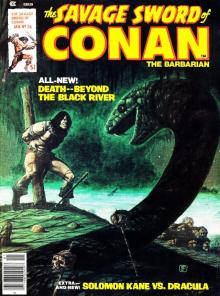 Beyond the Black River
Beyond the Black River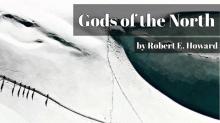 Gods of the North
Gods of the North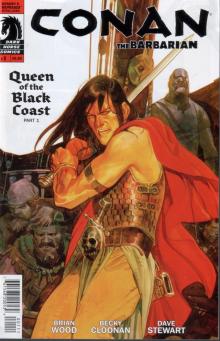 Queen of the Black Coast
Queen of the Black Coast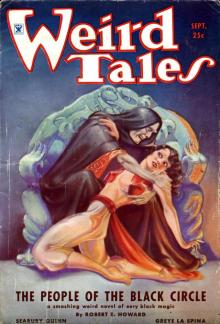 The People of the Black Circle
The People of the Black Circle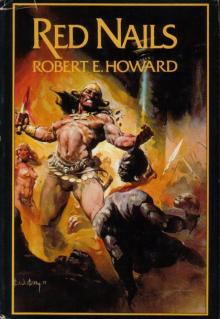 Red Nails
Red Nails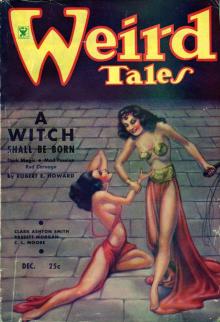 A Witch Shall Be Born
A Witch Shall Be Born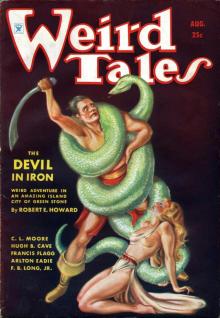 The Devil in Iron
The Devil in Iron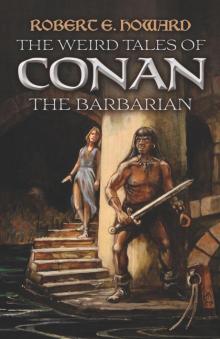 The Weird Tales of Conan the Barbarian
The Weird Tales of Conan the Barbarian The Bloody Crown of Conan
The Bloody Crown of Conan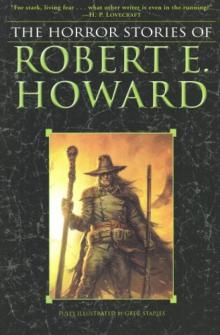 The Horror Stories of Robert E. Howard
The Horror Stories of Robert E. Howard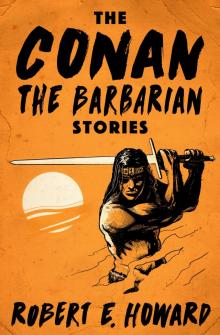 Conan the Conqueror
Conan the Conqueror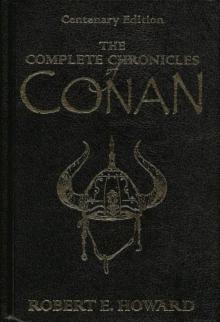 Conan the Barbarian
Conan the Barbarian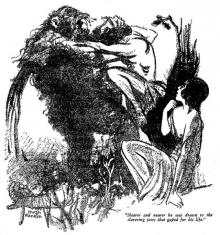 Shadows in the Moonlight
Shadows in the Moonlight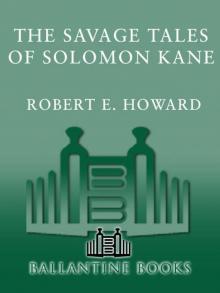 The Savage Tales of Solomon Kane
The Savage Tales of Solomon Kane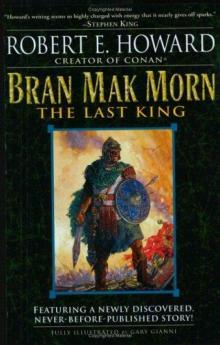 Bran Mak Morn: The Last King
Bran Mak Morn: The Last King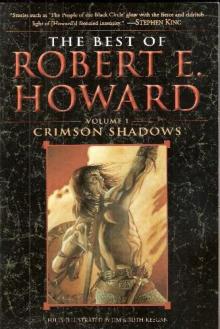 The Best of Robert E. Howard Volume One: Crimson Shadows
The Best of Robert E. Howard Volume One: Crimson Shadows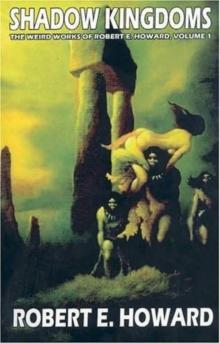 The Best of Robert E. Howard: Crimson Shadows (Volume 1)
The Best of Robert E. Howard: Crimson Shadows (Volume 1)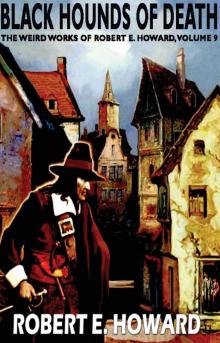 Black Hounds of Death
Black Hounds of Death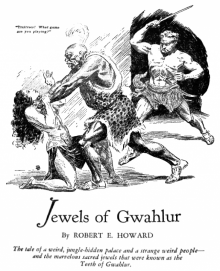 Jewels of Gwahlur
Jewels of Gwahlur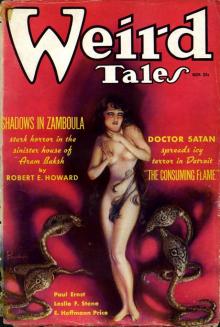 Shadows in Zamboula
Shadows in Zamboula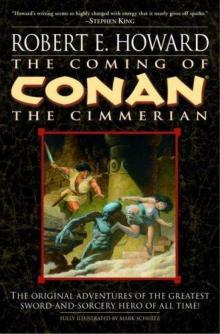 The Coming of Conan the Cimmerian
The Coming of Conan the Cimmerian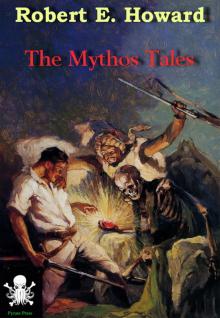 The Mythos Tales
The Mythos Tales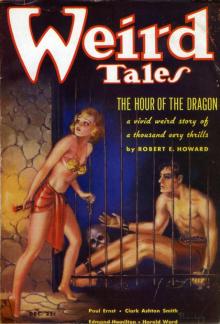 The Hour of the Dragon
The Hour of the Dragon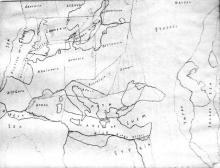 The Hyborian Age
The Hyborian Age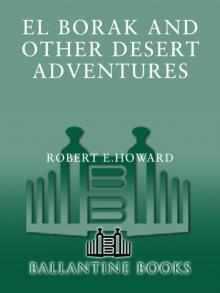 El Borak and Other Desert Adventures
El Borak and Other Desert Adventures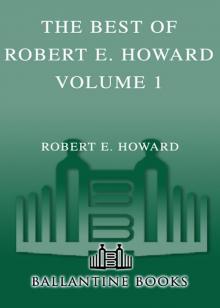 The Best of Robert E. Howard Volume 1 The Best of Robert E. Howard Volume 1
The Best of Robert E. Howard Volume 1 The Best of Robert E. Howard Volume 1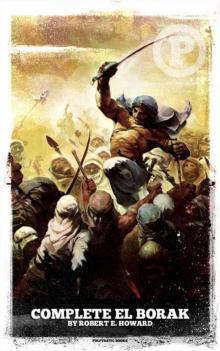 El Borak: The Complete Tales
El Borak: The Complete Tales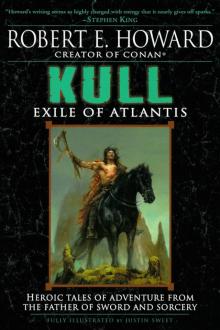 Kull: Exile of Atlantis
Kull: Exile of Atlantis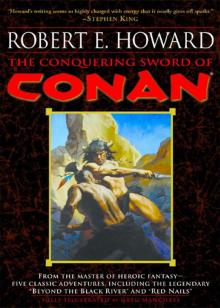 The Conquering Sword of Conan
The Conquering Sword of Conan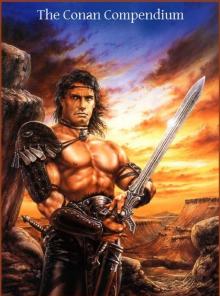 The Conan Compendium
The Conan Compendium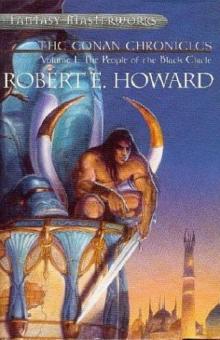 The Conan Chronicles: Volume 1: The People of the Black Circle
The Conan Chronicles: Volume 1: The People of the Black Circle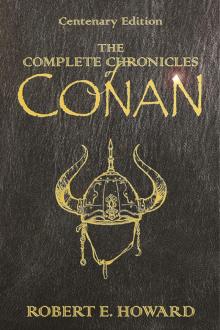 The Complete Chronicles of Conan: Centenary Edition
The Complete Chronicles of Conan: Centenary Edition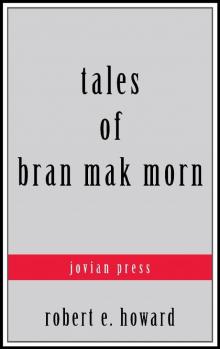 Tales of Bran Mak Morn (Serapis Classics)
Tales of Bran Mak Morn (Serapis Classics)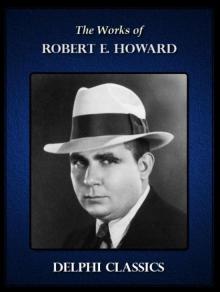 Delphi Works of Robert E. Howard (Illustrated) (Series Four)
Delphi Works of Robert E. Howard (Illustrated) (Series Four)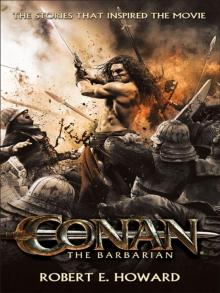 Conan the Barbarian: The Stories That Inspired the Movie
Conan the Barbarian: The Stories That Inspired the Movie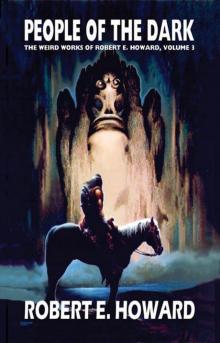 People of the Dark Robert Ervin Howard
People of the Dark Robert Ervin Howard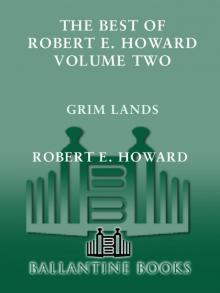 Grim Lands
Grim Lands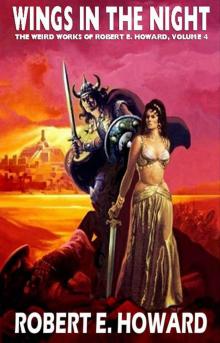 Wings in the Night
Wings in the Night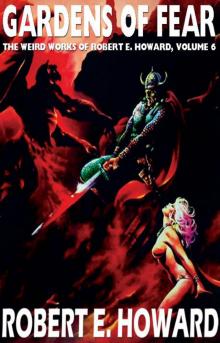 Gardens of Fear
Gardens of Fear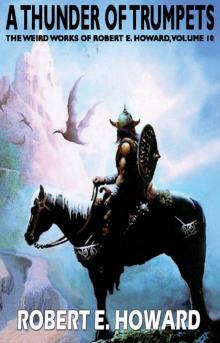 A Thunder of Trumpets
A Thunder of Trumpets Detective of the Occult
Detective of the Occult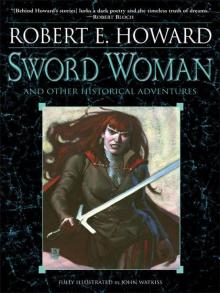 Sword Woman and Other Historical Adventures
Sword Woman and Other Historical Adventures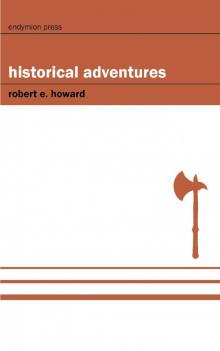 Historical Adventures
Historical Adventures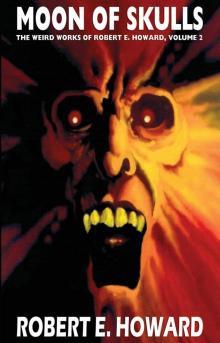 Moon of Skulls
Moon of Skulls The Robert E. Howard Omnibus: 97 Collected Stories
The Robert E. Howard Omnibus: 97 Collected Stories The Pirate Story Megapack: 25 Classic and Modern Tales
The Pirate Story Megapack: 25 Classic and Modern Tales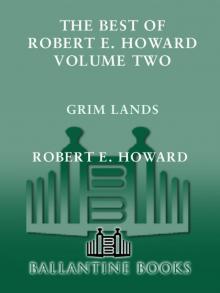 The Best of Robert E. Howard, Volume 2
The Best of Robert E. Howard, Volume 2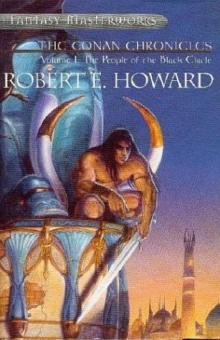 The Conan Chronicles, Vol. 1: The People of the Black Circle
The Conan Chronicles, Vol. 1: The People of the Black Circle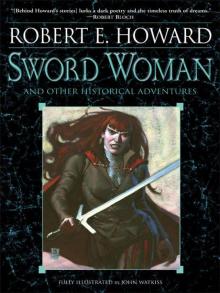 Sword Woman and Other Historical Adventures M
Sword Woman and Other Historical Adventures M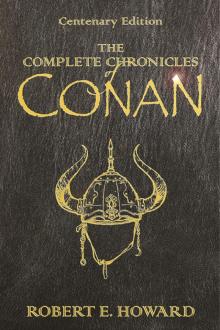 The Complete Chronicles of Conan
The Complete Chronicles of Conan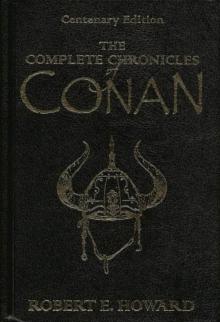 Conan the Barbarian: The Chronicles of Conan (collected short stories)
Conan the Barbarian: The Chronicles of Conan (collected short stories)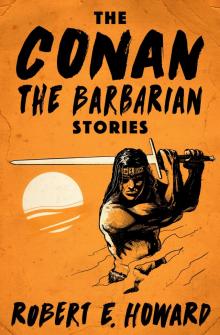 The Conan the Barbarian Stories
The Conan the Barbarian Stories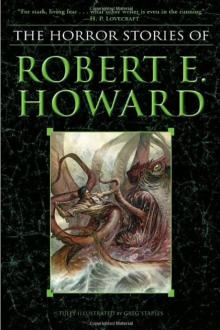 The Best Horror Stories of
The Best Horror Stories of Tigers Of The Sea cma-4
Tigers Of The Sea cma-4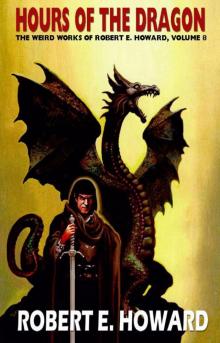 The Hours of the Dragon
The Hours of the Dragon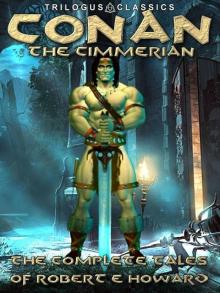 Conan the Cimmerian: The Complete Tales (Trilogus Classics)
Conan the Cimmerian: The Complete Tales (Trilogus Classics)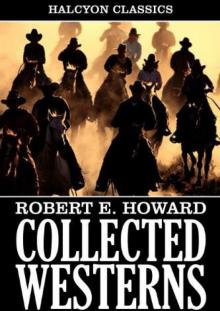 Collected Western Stories of Robert E. Howard (Unexpurgated Edition) (Halcyon Classics)
Collected Western Stories of Robert E. Howard (Unexpurgated Edition) (Halcyon Classics)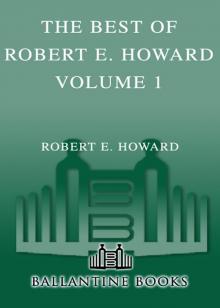 The Best of Robert E. Howard, Volume 1
The Best of Robert E. Howard, Volume 1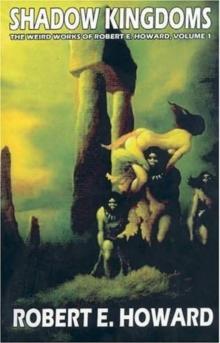 Shadow Kingdoms
Shadow Kingdoms